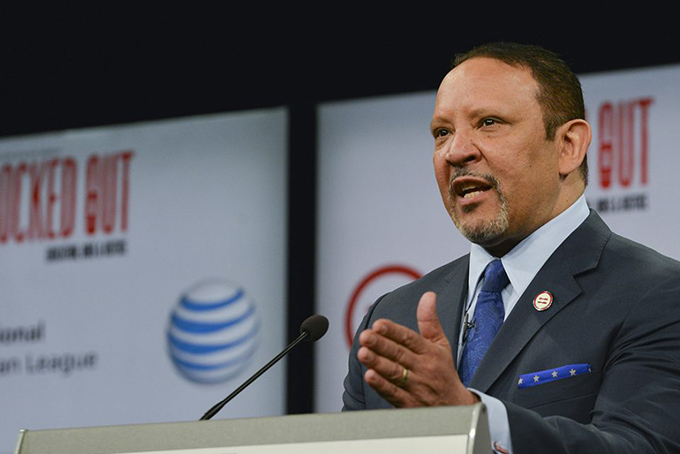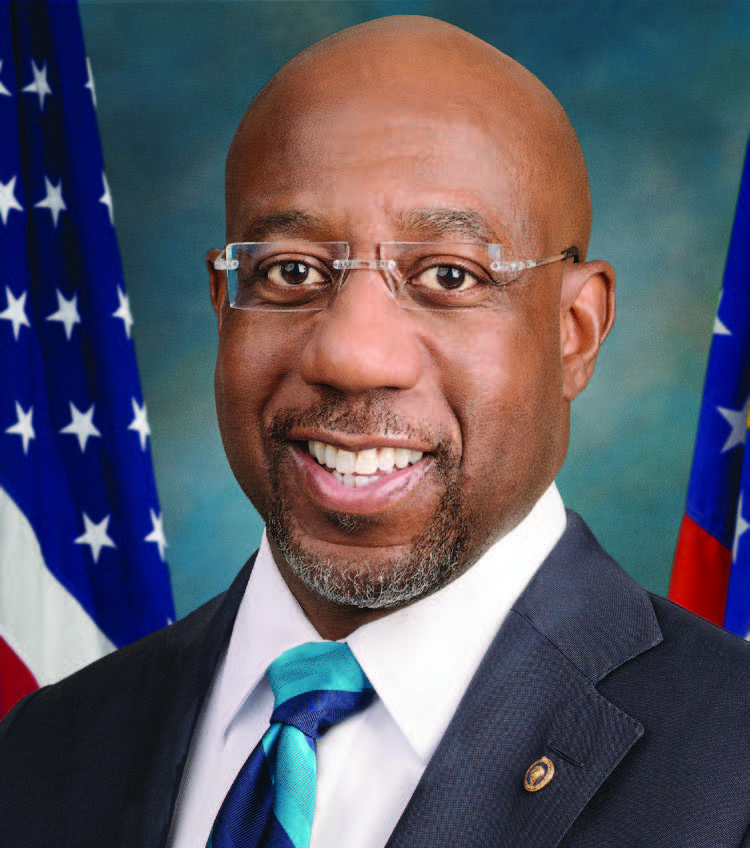by Barrington M. Salmon
For New Pittsburgh Courier
(TriceEdneyWire.com)—Donald Trump no longer occupies the White House, but he continues to cast a long shadow over one crucial aspect of politics: access to free and fair elections in the United States.
After election results last November showed that he and Vice President Mike Pence were soundly beaten by Biden/Harris ticket to the tune of seven million votes, Trump proclaimed loudly and often that the election had been stolen.
And on the basis of what the media and pundits have dubbed, “The Big Lie,” Republican-dominated legislatures across the nation have been busy this legislative session proposing, introducing and passing a flurry of bills they say is aimed at maintaining “voter integrity.” Voting rights and Civil Rights activists contend, however, that the bills are a way to choke off free and fair elections at a time when record numbers of voters—primarily Black, Latino, Native American and Asians—cast ballots in the November 2020 and January 5, 2021 elections contests.
President Bident has called it “Jim Crow in the 21st Century.”
According to the Brennan Center for Justice at New York University Law School, Republican legislators have filed more than seven times the number of restrictive bills as roughly compared to this time last year. These bills primarily seek to limit mail voting and impose stricter voter ID requirements, Brennan staff said.
“At least 253 bills with provisions restricting voting access have been introduced, pre-filed, or carried over in 43 states, mostly by Republicans, according to analysis by the Brennan Center, dwarfing the number of similar bills filed at this point in 2020. The report says many of the measures are in response to a “rash of baseless and racist allegations of voter fraud and election irregularities” that former President Trump and his Republican allies promoted for months without any evidence.”
Eliza Sweren-Becker, Voting Rights & Elections counsel at the Brennan Center, said the strategy these legislatures are employing is deeply concerning.
“I have seen bills in a handful of states like Pennsylvania and Texas that were introduced or are a precursor of bills to introduce a rollback,” she said in an interview before legislative sessions began around the country. “A lot of politicians see voter suppression as a protection plan, a way to stay in office, maintain power. Legislatures have the right to weigh how voting and federal elections are to be operated but they don’t have a right to deny people access to vote.”
Sweren-Becker continues, “We’re starting to see a legislative backlash developing. It’s a one-two punch to blunt Americans’ ability to vote. What we saw in November 2020 and in Georgia is that Americans are resilient. They do not like when politicians take away their ability to vote.”
Danielle Root, director of the Voting Rights and Access to Justice program at the Center for American Progress, said she worries about the impact on the public psyche the lies and assorted efforts Republicans have used to undermine voting by mail and other elements of the voting process have had.
“My biggest concern is the lies and misleading comments made by Trump and certain members of his party,” she said. “This sows confusion and damages public faith in elections … I have seen so much voter suppression by Republicans. I can only assume the worst. We have to push back against the people spreading this false narrative. It is a brazen attack on the process. It’s nefarious, really damaging and makes people not want to vote. Every time you think progress is being made, we end up going backwards. I don’t have a good answer as to why they are allowed to do this.”
In Iowa, the governor recently signed a bill that cuts the time allowed for absentee and in-person voting and also prevents local elections officials from setting up additional locations to ease the early voting process. Meanwhile, in Texas, Republican legislators have proposed policies that range from restrictions on voter registration; tightening eligibility on absentee voting; prohibit jurisdictions from expanding voting hours; limiting the ability of election workers to protect voters from the illegal disruption and harassment of poll watchers; require voters with disabilities to provide documentation in order to qualify to vote by mail; and allowing poll watchers to video or record voters.
States including Florida, Arizona, Texas and Wisconsin are moving forward with efforts to restrict voting in states. But the state voting and civil rights advocates and activists say has become the epicenter, ground zero for voter suppression is Georgia. On March 25, Gov. Brian Kemp signed into law SB 202 which will impose new ID requirements on people seeking to vote by mail; limits the use of drop boxes for absentee ballots; shorten the time for runoff races; and criminalizes anyone who gives food or water to prospective voters standing in line to vote.

MARC MORIAL
Marc Morial told the Trice Edney News Wire that this law and other proposals in Republican-dominated legislatures is motivated by a desire to suppress the votes of Black and brown communities nationally.
“This is an assault on democracy that has as its motivation the toxic mix of race, power and the sour grapes of losing the election,” said Morial, National Urban League president and CEO. “They’re mad because they lost and because Black people turned out in large numbers. It will be resisted. It makes some of the things that happened during Jim Crow seem like a picnic. It’s undemocratic and un-American…. It has to be stopped. It has no legitimacy, and it isn’t a case of election integrity which is a big, fat lie. They are sowing fear and division which has to be resisted. This is nothing new. This is just voter suppression on steroids. The Voting Rights Act stopped much of what was happening in the South.”
Voting rights activists such as LaTosha Brown, of Black Votes Matter, national voting rights superstar Stacy Abrams of Georgia and a raft of other activists are fighting back. They say the GOP has declared war on Black people.
Nicole Henderson, director of communication for the New Georgia Project Action Fund, her colleagues at the New GeorgiaProject, and others like LaTosha Brown said they are determined to fight as they have for the past several years to defeat the Republican forces who’re determined, some critics contend, to make America a nation governed by permanent White minority rule.
In order to counter the Republican efforts, activists and advocates said there are a number of tools that opponents are prepared to use, including putting intense pressure on lawmakers and on corporations to get off the fence and then offer support and put pressure on those in Congress to pass H.R. 1 and H.R. 4.
H.R. 1 was the first bill passed by the then-newly Democratically controlled House of Representatives in 2018. Called the “For the People Act,” it is a sweeping legislative measure that seeks “to expand Americans’ access to the ballot box, reduce the influence of big money in politics, and strengthen ethics rules for public servants and for other purposes.” H.R. 4 “establishes new criteria for determining which states and political subdivisions must obtain preclearance before changes to voting practices in these areas may take effect.”

U.S. SEN. RAPHAEL WARNOCK
Georgia Sen. Raphael Warnock appears anxious that new Democratically led issues, such as the Biden Administration’s focus on the infrastructure could over shadow voting rights.
Warnock told reporters on CNN’s State of the Union, “We have got to work on the infrastructure of our country, our roads and our bridges, and we have got to work on the infrastructure of our democracy…After all, the only reason we’re able to get anything done, have the prospects of getting more done this Congress, is because people were able to show up and express their voices in their democracy.”